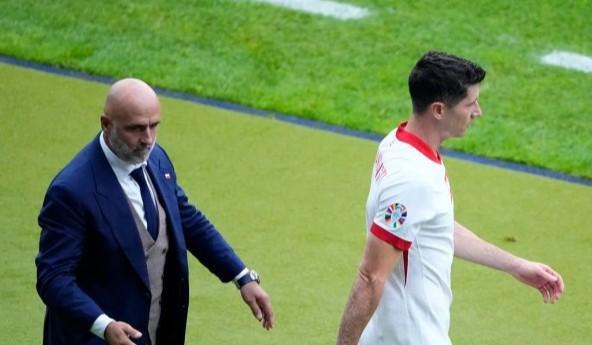
Title: Was removed from captaincy in one-minute phone call: Lewandowski
Robert Lewandowski, the star Polish footballer, has been making waves in the football world with his recent interview where he opened up about his decision to quit the team. The 34-year-old striker has been a vital part of the Polish national team, scoring over 70 goals in 128 appearances. However, his recent comments have shed light on a tumultuous relationship with his coach, Michał Probierz, and the manner in which he was removed from the captaincy.
In the interview, Lewandowski revealed that he received a surprise phone call from Probierz, where the coach informed him that he had decided to take away his armband. The conversation, according to Lewandowski, lasted only about a minute. The way in which this was communicated to him is, as he put it, “really surprising to me.”
The removal of Lewandowski from the captaincy came as a shock to many, especially considering his impressive performance for the national team. The striker has been one of the most consistent players for Poland, and his leadership was seen as crucial in the team’s success. However, it appears that there were underlying issues between Lewandowski and Probierz that ultimately led to the coach’s decision.
Lewandowski’s comments have sparked a heated debate about the management style of Probierz and the manner in which he handled the situation. Many have criticized the coach for not communicating his decision clearly and respectfully to Lewandowski, especially considering the player’s importance to the team.
The incident has also raised questions about the role of captaincy in a team. Is it a mere ceremonial position, or does it carry significant importance in terms of leadership and decision-making? Lewandowski’s removal from the captaincy has sparked a discussion about the value of leadership in football, and whether it is fair to remove a player from this position without proper communication and explanation.
Furthermore, Lewandowski’s comments have also shed light on the importance of communication in a team. In football, communication is key to success, and the manner in which players and coaches interact can make or break a team’s performance. Lewandowski’s experience highlights the importance of open and respectful communication, especially when it comes to important decisions such as removing a player from the captaincy.
In conclusion, Lewandowski’s recent comments have added a new dimension to the debate about captaincy and leadership in football. The manner in which he was removed from the captaincy has sparked a heated debate about the management style of Probierz and the importance of communication in a team. As the football world continues to discuss this incident, one thing is clear – Lewandowski’s leadership and performance on the pitch will be remembered for years to come.






